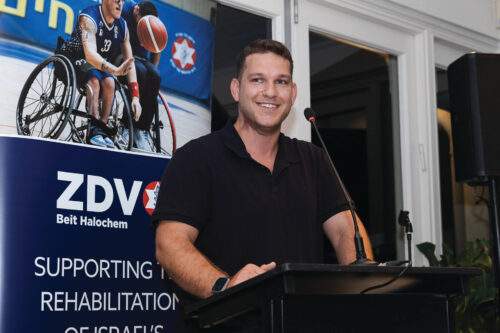On the morning of October 11, Itay Sagy, a 25-year-old reservist in Israel’s elite Maglan special forces, embarked on a mission with his team to confront Hamas forces. Their destination: near Kibbutz Zikim, one of the many areas deeply scarred by terror during the October 7 attacks. What began as a routine operation quickly turned into a nightmare.
The truck carrying Itay and his team broke down en route. With no time to waste, they split into two groups—one stayed behind to repair the vehicle, while the other moved to a nearby bomb shelter to take cover from the rockets still raining down on the area.
But safety was an illusion that day. As Itay’s group reached the shelter, they were ambushed by eight armed Hamas terrorists.
“It was chaos,” Itay recalls. “Eight terrorists opened fire on us from all directions. Three of my friends were killed on the spot, and the rest of us fought like crazy to survive.”
Despite being outnumbered, Itay and his team fought back with unrelenting determination. In the heat of the battle, Itay managed to take down two attackers. But then the grenades came.
“I dodged the first two grenades, but I didn’t see the third one,” he recounts. “It landed near me and exploded. Shrapnel ripped through my neck.”
A Fight for Survival
As blood poured from his neck wound, Itay’s survival depended on the quick thinking of a medic who was part of the team.
“A medic kept his hand on my neck, trying to control the bleeding,” Itay says. “He refused to let go, even as the battle raged around us.”
For 40 agonizing minutes, Itay’s team fought to neutralize the ambush. When the last of the attackers were eliminated, Itay was finally evacuated by helicopter to a hospital in Tel Aviv. Those forty minutes felt like an eternity, but they ultimately saved his life.
A Mother’s Worst Fear
Itay’s mother, like so many others, had lived in constant worry for her son’s safety. The news of his injury brought her worst fears to life.
“It’s very hard for a mother to part with her children and send them into battle, even when she knows it’s for the greater good of our nation,” she says. “When you find out that your child has been wounded during combat, it’s even harder.”
Her words echo the pain felt by countless families across Israel—families who bear the heavy burden of knowing their loved ones are risking everything to defend their homeland.
The Road to Recovery
For Itay, the battle didn’t end when the shooting stopped. The journey to recovery has proven to be its own kind of fight.
While recovering in the hospital, Itay was visited by representatives from Beit Halochem, an organization dedicated to helping wounded soldiers rebuild their lives. These visits offered a glimmer of hope during an otherwise dark and uncertain time.
“They told me there is life after injury,” Itay recalls. “Their message gave me strength. As a fighter, and with Beit Halochem’s help, I will never give up on my dreams.”
Now, Itay is a regular visitor to Beit Halochem, where he undergoes physiotherapy to heal his physical wounds. But the scars of war aren’t just physical. Like many veterans, Itay faces the challenge of living with Post-Traumatic Stress Disorder (PTSD).
Beit Halochem’s holistic approach to recovery, which includes both physical therapy and emotional support, has become an essential part of Itay’s journey.
Dreams of the Future
Before the ambush, Itay was pursuing a degree in law and administration—a dream he refuses to give up on. Despite the pain and challenges he faces, he’s determined to complete his studies and create a future for himself beyond the battlefield.
Itay’s resilience and optimism are nothing short of inspiring. “The road is tough,” he admits, “but I know I can overcome it. Beit Halochem has shown me that there’s a life worth fighting for, even after injury.”
Why Itay’s Story Matters
Itay’s story is more than a tale of survival—it’s a testament to the strength of the human spirit and the importance of community support. His courage in the face of unimaginable odds serves as a powerful reminder of the sacrifices made by Israel’s soldiers.
Beit Halochem’s role in his recovery underscores the critical need for organizations that prioritize the well-being of wounded veterans. As the number of injured soldiers continues to rise, the work of Beit Halochem is more essential than ever.
A Message of Hope
Itay Sagy’s journey is far from over, but his story offers hope to countless others who are facing similar battles. With the support of organizations like Beit Halochem, and the unwavering determination that defines Israel’s soldiers, recovery is not just a possibility—it’s a promise.

